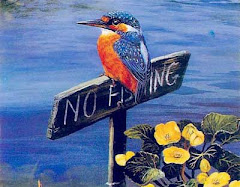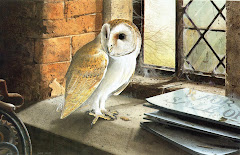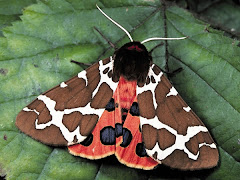
De ijsvogel (Alcedo atthis) is een klein bontgekleurd
vogeltje uit de familie der ijsvogels (Alcedinidae).
Het is de enige algemeen in Europa voorkomende ijsvogelsoort.
~
The Common Kingfisher, Alcedo atthis, also known
as Eurasian Kingfisher or River Kingfisher,
is a small kingfisher with seven subspecies distributed
across Eurasia and North Africa. It is resident in much
of its range, but migrates from areas in which
the rivers freeze in winter.
This sparrow-sized bird has the typical short-tailed,
large-headed kingfisher profile; it has blue upperparts,
orange underparts and a long bill. It feeds mainly on fish,
caught by diving, and has special visual adaptions to enable
it to pursue its prey under water. The glossy white eggs
are laid in a nest at the end of a burrow in a riverbank.

Ze hebben een snelle, rechte vlucht,
vaak vlak langs het wateroppervlak.
Hij kan op deze manier snelheden
bereiken van maximaal 80 km per uur.
~
The flight of the Kingfisher is fast, direct and usually
low over water. The short rounded wings whirr rapidly,
and a bird flying away shows an electric-blue "flash"
down its back.
In North Africa, Europe and Asia north of the Himalayas
this is the only small blue kingfisher.

Hij is vaak te vinden op een vaste uitkijkpost
nabij het water, vanwaar hij zijn prooidieren gadeslaat.
Ook zit hij vaak in de schaduw van overhangende struiken.
Deze plaats bevindt zich zo'n één tot drie meter
boven het water. Als de uitkijkplaats te laag is,
vliegt hij eerst omhoog waarna hij naar beneden duikt.
Zijn prooidieren zijn meestal 3 tot 5 cm lang,
maximaal 7 cm.
Vissen beslaan zo'n 78% van het dieet.
~
The Common Kingfisher hunts from a perch 1–2 m
(3–6 ft) above the water, on a branch, post or riverbank,
bill pointing down as it searches for prey.
It bobs its head when food is detected to gauge the distance,
and plunges steeply down to seize its prey usually no
deeper than 25 cm (19 in) below the surface.
The wings are opened under water and the open eyes are
protected by the transparent third eyelid.
The bird rises beak-first from the surface and flies back
to its perch. At the perch the fish is adjusted until it is
held near its tail and beaten against the perch several times.
Once dead, the fish is positioned lengthways and
swallowed head-first. A few times each day, a small
greyish pellet of fish bones and other
indigestible remains is regurgitated.

Onverteerbare delen als graten, schubben en
chitineresten worden met een kleine, ovale braakbal
uitgebraakt. Deze braakballen worden overigens
maar zelden gevonden omdat de braakbal
vaak in het water verdwijnt .
~
The food is mainly fish up to 12.5 cm (5 in) long,
but the average size is 2.3 cm (1 in).
Minnows, sticklebacks, small roach and trout are
typical prey. About 60% of food items are fish,
but this kingfisher also catches aquatic insects such
as dragonfly larvae and water beetles, and, in winter,
crustaceans including freshwater shrimps

Tegen de broedtijd maken de ijsvogels met hun snavel
een gang bij een rechte oevers van hun viswater.
De gang is ongeveer 1 meter lang.
Aan het eind van de gang wordt een soort kamer gemaakt.
In die kamer leggen ze de eieren en daar broeden ze ze ook uit.
In Nederland leven (nog) een paar honderd koppeltjes!
~
By the time kingfishers breed, they make with their beaks
a corridor in a straight shore in the
district of their fishing waters.
The corridor is approximately 1 meter long.
At the end of the corridor there is a room made.
In that room, they lay there eggs and breed them.

Kennen jullie deze natuurfotograaf al?
Zijn naam is Han Bouwmeester en je kunt z’n
prachtige foto’s zien op zijn website:
www.hanbouwmeester.nl/
~
Let me introduce this nature photographer
He is called Han Bouwmeester and you can find his
beautiful photographs on his website:
www.hanbouwmeester.nl/


































Geen opmerkingen:
Een reactie posten